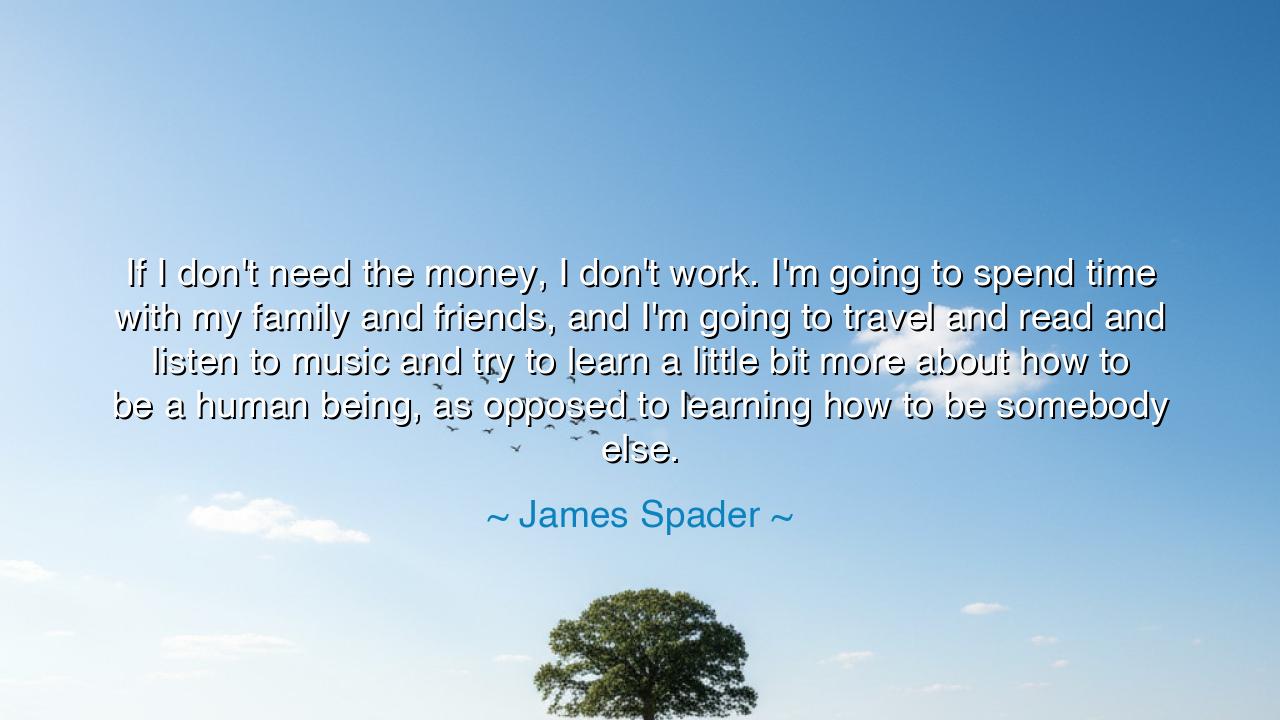
If I don't need the money, I don't work. I'm going to spend time
If I don't need the money, I don't work. I'm going to spend time with my family and friends, and I'm going to travel and read and listen to music and try to learn a little bit more about how to be a human being, as opposed to learning how to be somebody else.






The words of James Spader—“If I don't need the money, I don't work. I'm going to spend time with my family and friends, and I'm going to travel and read and listen to music and try to learn a little bit more about how to be a human being, as opposed to learning how to be somebody else.”—are the quiet confession of a man who has seen both fame and its emptiness. They are the words of one who has walked through the noise of success and discovered that to live well is not to accumulate roles, but to return to oneself. In them lies a truth that echoes through the ages: that the purpose of life is not endless striving, but self-understanding, the gentle art of being rather than performing.
The origin of this quote comes from Spader’s reflections on his career as an actor—a profession devoted to becoming other people. After decades of embodying characters, he recognized that while art can reveal truth, it can also distance one from one’s own essence. His declaration is not a renunciation of work, but a reclaiming of balance. He seeks what many forget: the space to breathe, to love, to learn not from scripts, but from silence. In a world that praises productivity, Spader dares to speak of presence—of a life that is rich not in possessions or accomplishments, but in awareness and connection.
This idea is as old as wisdom itself. The ancient philosophers of both East and West warned against the enslavement of the soul to labor and ambition. The Greek sage Epicurus taught that happiness lies not in wealth or fame, but in simple pleasures—the companionship of friends, the beauty of nature, the freedom of an untroubled mind. The Taoists of China said that one who is always becoming someone else forgets the mystery of simply being. And in the writings of Marcus Aurelius, the Roman emperor who ruled a vast empire, we find a similar humility: “Waste no more time arguing about what a good man should be. Be one.” Spader’s insight carries the same ancient fragrance—the reminder that the highest art is the art of living humanly.
History, too, bears witness to this awakening. The great painter Paul Gauguin abandoned the glittering salons of Paris to live among the people of Tahiti, seeking not wealth but truth. The philosopher Henry David Thoreau, weary of the noise of civilization, withdrew to a cabin by Walden Pond and wrote, “I went to the woods because I wished to live deliberately.” Like them, Spader’s choice is not escapism, but pilgrimage—a journey inward, toward authenticity. He reminds us that to “learn how to be a human being” is not idleness, but the most demanding of all studies.
His mention of family, friends, music, travel, and reading reveals the ingredients of this sacred learning. These are the teachers of the soul. To travel is to rediscover wonder; to read is to commune with minds across time; to listen to music is to remember that beauty needs no purpose; and to love—deeply, imperfectly, presently—is to practice the essence of being human. These are not luxuries, but necessities for the spirit. For in them we remember what no work can teach: that existence itself is enough.
There is, too, a quiet rebellion in his words. In an age that equates identity with career and value with productivity, Spader’s philosophy restores dignity to stillness. He refuses to let labor define him, and in doing so, he challenges the very sickness of modern civilization—the belief that rest is waste. The ancients called this disease hubris, the arrogance of forgetting that man is not a machine but a soul. To rest, to reflect, to feel—these are not acts of weakness, but of wisdom. Only those who have learned to pause can truly act with meaning.
The lesson, then, is clear and enduring: work should serve life, not consume it. Seek not only to make a living, but to make a life. Spend time with those you love, wander where curiosity calls, and learn from silence as much as from sound. Do not mistake achievement for fulfillment, nor busyness for purpose. To “learn how to be a human being,” as Spader says, is to cultivate presence, gratitude, and tenderness—to remember that life is not a performance to perfect, but a mystery to experience.
So let us take his words as a vow to ourselves: when the hunger for more begins to cloud our hearts, may we return to the simplicity of being. May we listen to music and remember our rhythm, read and remember our roots, travel and remember our smallness, love and remember our belonging. For in the end, as every wise soul has discovered, the greatest education is not in how to play a part—but in how to be fully, courageously, and beautifully human.






AAdministratorAdministrator
Welcome, honored guests. Please leave a comment, we will respond soon